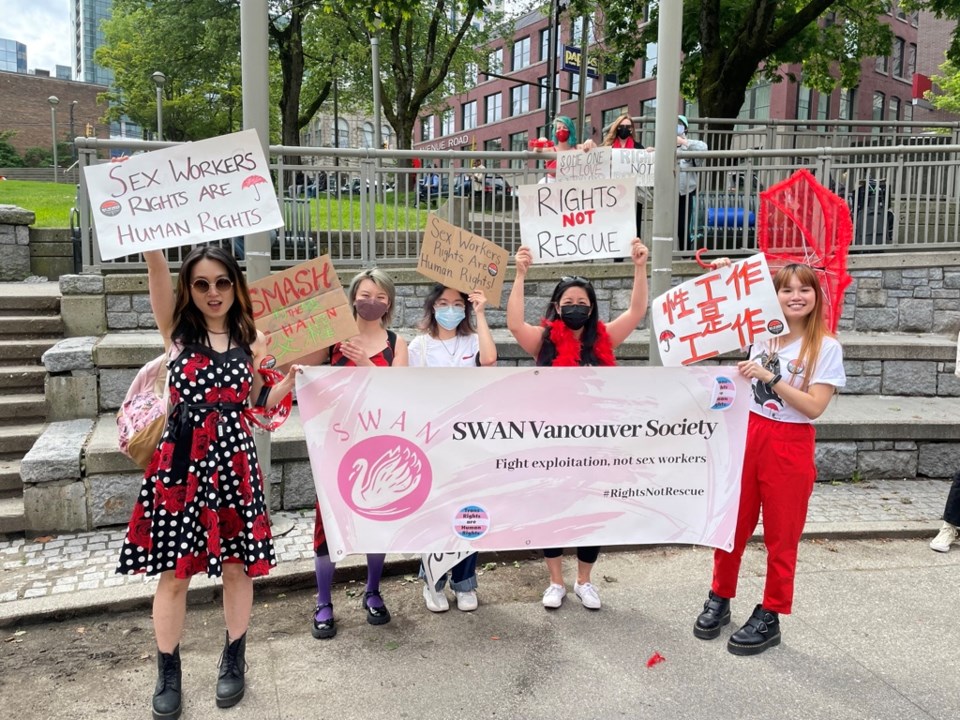This October marks the 20th anniversary of SWAN, a Vancouver-based organization that advocates for the rights, health, and safety of immigrant sex workers in the Lower Mainland through outreach, education and social support, legal aid, and reporting systems.
"Think of our work as a mix between a union and a social service agency," explains Alison Clancey, the program director at SWAN.
Immigrant and racialized sex workers are at the intersection of an already stigmatized and criminalized industry which places them at higher risk of violence than the general population. According to Clancey, these factors mean that society often condones violence perpetrated against them. "The law does not offer legal and labour protections and actually criminalizes many of the actions sex workers take to keep themselves safe," she says.
For instance, municipal bylaws and enforcement penalize women working in municipally licensed massage businesses for locking their doors. Federal sex work laws also criminalize women for working together, which is safer. Clancey adds that "immigration policies criminalize temporary residents for working in the sex industry, which means sex workers cannot report violence to the police without risking arrest and deportation. Anti-trafficking ‘rescue’ raids mean sex workers fear police more than predators and create antagonistic relations with law enforcement."
SWAN provides the workers with somewhere to turn when the laws meant to help them do more harm than good.
The organization visits women where they work and addresses health, social, legal, immigration, and work-related issues, providing English classes and other educational and social opportunities, such as legal webinars and community outings.
SWAN also has a bad date reporting system, similar to that of WISH, which is an organization that works to improve the health, safety and well-being of women who are involved in Vancouver’s street-based sex trade. SWAN sends out text messages warning women so they can take precautions to protect themselves. The group has also distributed over 630,000 condoms and 21,000 masks over the last year to aid workplace protections.
'Mainstream community services are inaccessible to the women we support'
Clancey admits that although it has been 20 years since SWAN was founded, unfortunately not much has changed. "In fact, the stigma, isolation, exclusion, and criminalization have increased as society now views [sex workers] from a more regressed and morals-based lens. All this, while the battle for labour and legal rights continues," she laments. "SWAN exists because mainstream community services are inaccessible to the women we support. While we have been advocating with these women to have equitable labour, legal and immigration rights, much more advocacy is needed now, more than ever, because of the conflation between sex work and human trafficking."
She clarifies that sex workers advocate for decriminalization, not legalization.
Legalization, according to Clancey, would introduce regulations through layers of bureaucracy similar to marijuana legalization and further perpetuate the over-policing of BIPOC sex workers. She believes it would create a two-tiered system wherein sex workers living and working in more challenging situations would not be able to adhere to the regulations.
"The Criminal Code already covers every conceivable crime that could be carried out against a sex worker such as assault, extortion, and confinement, among other crimes," she expounds. Decriminalization would remove criminal penalties associated with the sex industry, for example, those on advertising and communicating. It would also help to prevent human trafficking because sex workers would be more easily able to report abuse and exploitation. She says that when sex work is criminalized and driven underground, it creates environments where human trafficking can thrive.
She is also clear that decriminalization doesn’t mean a free-for-all, more so it opens up a pathway to occupational health and safety regulations and labour standards like those that exist for other types of work.
As SWAN looks back on the last 20 years it's a bittersweet reflection, they have helped thousands of women but as they look toward the future they are still fighting the same fight and there is much work to be done.
Learn more about how to get involved with or donate to SWAN.




